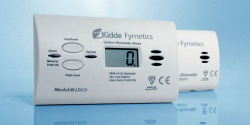

New Building Regulations will see carbon monoxide alarms made mandatory in Northern Ireland from 31 October.
The new Northern Ireland Building Regulations Part L Technical Booklet requires a CO alarm to be fitted in the same room as any combustion appliance not designed solely for cooking, or just outside boiler rooms. Alarms should comply with BS EN 50291 and can be either hard-wired mains powered, or battery – but only where this is designed to operate for the whole working life of the alarm.
This new requirement contrasts with the 2010 Part J Approved Document, applying to England and Wales, which applies only to fixed solid fuel heating appliances – and a complete absence of CO alarm requirement in Scottish Standards.
The number of deaths from CO poisoning has continued to rise in recent years, involving appliances including solid fuel and wood-burning stoves, gas boilers and bottled-gas mobile heaters. As a result, there are growing calls for regulations across the UK to make CO alarms mandatory in all new homes and with replacement combustion appliances.
The Health & Safety Executive (HSE) recommends that: “Before purchasing a CO alarm, always ensure it complies with British Standard EN 50291 and carries a British or European approval mark, such as a Kitemark.”
This third party approval is essential – just a CE mark is not enough – to demonstrate consistent performance, so ensuring occupant safety and avoiding the legal implications of supplying or fitting unapproved alarms.
A range of different CO alarms are available on the market. Kidde Fyrnetics' TenYCO range of self-contained, battery CO alarms (pictured) comes with a 10-year guarantee, and can be wall-mounted or used freestanding. The alarm is powered by ultra long-life lithium batteries, also covered by Kidde’s 10-year guarantee.
If you'd like to keep up-to-date with the latest developments in the heating and plumbing industry, why not subscribe to our weekly newsletters? Just click the button below and you can ensure all the latest industry news and new product information lands in your inbox every week.